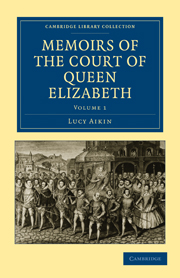Book contents
- Frontmatter
- PREFACE
- CHAPTER I 1533 TO 1536
- CHAPTER II 1536 TO 1542
- CHAPTER III 1542 TO 1547
- CHAPTER IV 1547 TO 1549
- CHAPTER V 1549 TO 1553
- CHAPTER VI 1553 AND 1554
- CHAPTER VII 1554 AND 1555
- CHAPTER VIII 1555 TO 1558
- CHAPTER IX 1558 AND 1559
- CHAPTER X 1559
- CHAPTER XI 1560
- CHAPTER XII 1560
- CHAPTER XIII 1561
- CHAPTER XIII 1561 TO 1565
- CHAPTER XIV 1565 AND 1566
- CHAPTER XV 1567 AND 1568
- CHAPTER XVI 1568 TO 1570
- Frontmatter
- PREFACE
- CHAPTER I 1533 TO 1536
- CHAPTER II 1536 TO 1542
- CHAPTER III 1542 TO 1547
- CHAPTER IV 1547 TO 1549
- CHAPTER V 1549 TO 1553
- CHAPTER VI 1553 AND 1554
- CHAPTER VII 1554 AND 1555
- CHAPTER VIII 1555 TO 1558
- CHAPTER IX 1558 AND 1559
- CHAPTER X 1559
- CHAPTER XI 1560
- CHAPTER XII 1560
- CHAPTER XIII 1561
- CHAPTER XIII 1561 TO 1565
- CHAPTER XIV 1565 AND 1566
- CHAPTER XV 1567 AND 1568
- CHAPTER XVI 1568 TO 1570
Summary
Nothing could be more opposite to the strict principles of hereditary succession than the ideas entertained, even by the first lawyers of the time of Henry VIII., concerning the manner in which a title to the crown was to be established and recognised.
When Rich, the king's solicitor, was sent by his master to argue with sir Thomas More on the lawfulness of acknowledging the royal supremacy; he inquired in the course of his argument, whether sir Thomas would not own for king any person whatever,—himself for example,—who should have been declared so by parliament? He answered, that he would. Rich then demanded, why he refused to acknowledge a head of the church so appointed? “Because,” replied More, “a parliament can make a king and depose him, and that every parliament-man may give his consent thereunto, but a subject cannot be bound so in case of supremacy.” Bold as such doctrine respecting the power of parliaments would now be thought, it could not well be controverted at a time when examples were still recent of kings of the line of York or Lancaster alternately elevated or degraded by a vote of the two houses, and when the father of the reigning sovereign had occupied the throne in virtue of such a nomination more than by right of birth.
But the obvious inconveniences and dangers attending the exercise of this power of choice, had induced the parliaments of Henry VIII. to join with him in various acts for the regulation of the succession.
- Type
- Chapter
- Information
- Memoirs of the Court of Queen Elizabeth , pp. 25 - 57Publisher: Cambridge University PressPrint publication year: 2010First published in: 1818



